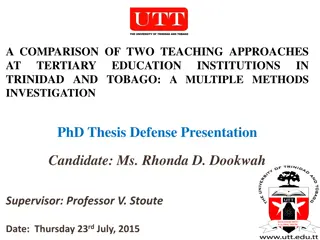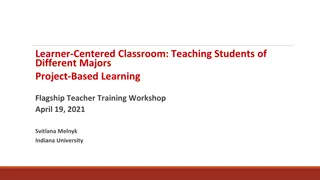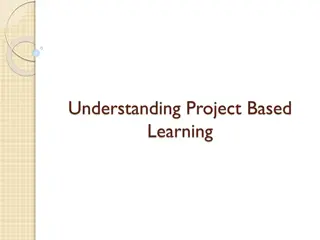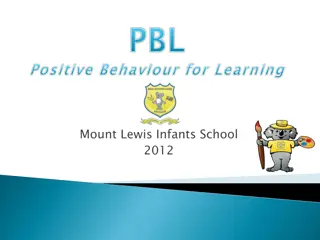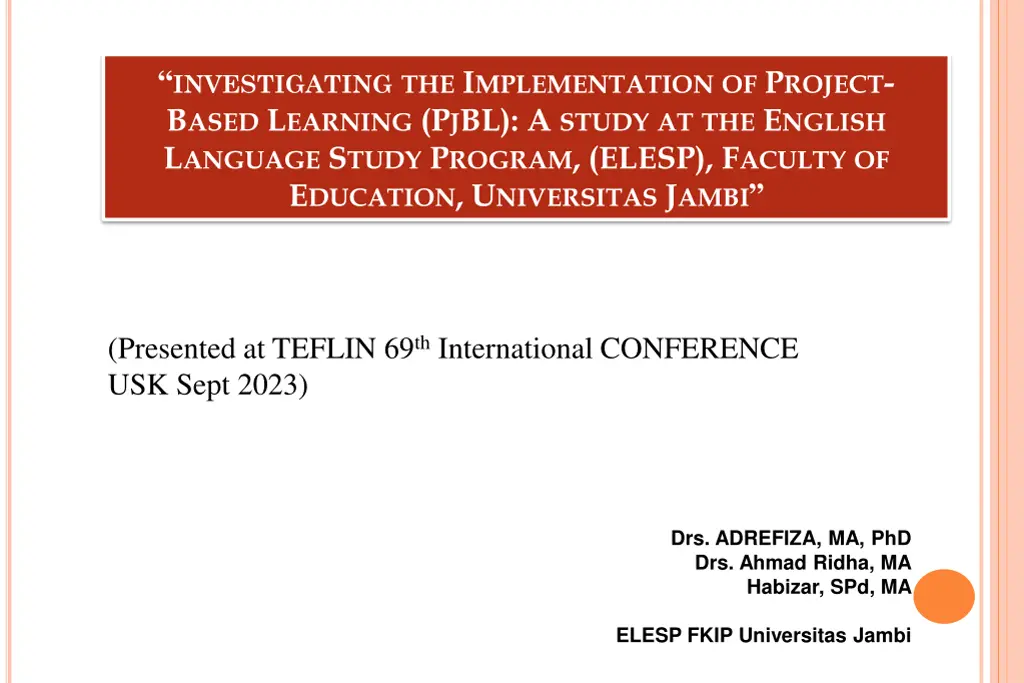
Investigating Project-Based Learning Implementation at Universitas Jambi
This study explores the implementation of Project-Based Learning (PjBL) at the English Language Study Program, Faculty of Education, Universitas Jambi. It aims to evaluate how lecturers implement PjBL, focusing on student evaluation and satisfaction. The methodology involves using Google Form questionnaires with 100 students to gather feedback on key PjBL principles. This research addresses two main questions regarding student perception and satisfaction with PjBL implementation.
Download Presentation

Please find below an Image/Link to download the presentation.
The content on the website is provided AS IS for your information and personal use only. It may not be sold, licensed, or shared on other websites without obtaining consent from the author. If you encounter any issues during the download, it is possible that the publisher has removed the file from their server.
You are allowed to download the files provided on this website for personal or commercial use, subject to the condition that they are used lawfully. All files are the property of their respective owners.
The content on the website is provided AS IS for your information and personal use only. It may not be sold, licensed, or shared on other websites without obtaining consent from the author.
E N D
Presentation Transcript
INVESTIGATING THE IMPLEMENTATION OF PROJECT- BASED LEARNING (PJBL): A STUDY AT THE ENGLISH LANGUAGE STUDY PROGRAM, (ELESP), FACULTY OF EDUCATION, UNIVERSITAS JAMBI (Presented at TEFLIN 69th International CONFERENCE USK Sept 2023) Drs. ADREFIZA, MA, PhD Drs. Ahmad Ridha, MA Habizar, SPd, MA ELESP FKIP Universitas Jambi
Background PiBL along with CM are central to IKU 7 Comm. skills/10thAPR2013/DADJU Lecturers are forced to implement the methods Trainings and socializations have been masive and many lecturers were shocked. The effication is in question and EVALUATION is required 2
Aims To evaluate the implementation of PjBL by the lecturers at ELESP Faculty of Teacher Training and Education (FKIP), Jambi University. Comm. skills/10thAPR2013/DADJU 3
Research Questions The study is based on two research questions: What is the student s evaluation on the implementation of PjBL by the lecturers in the teaching and learning process? And; How is the students satisfaction towards the implementation? Comm. skills/10thAPR2013/DADJU 4
Methods (Mixed) Google Form QUESTIONNAIRES 100 students were involved The questionnaires consist of 10 items about 10 main principles of PjBL with 5 Likert scales, ranging from Never to Always categories. Comm. skills/10thAPR2013/DADJU 5
PjBL Principles 1. The class starts with a driving question/issue/problem related to the topic to be discussed or solved 2. Students work independently in small groups based on a selected project. 3. The groups work based on schedule and timesheet as described in Syllabus. 4. The groups discuss, pose, inquire, analyze, and evaluate issues or problems related to the topics raised by lecturers. 5. The groups implement small projects independently outside classroom collecting information, facts, evident, data, to solve problems, build hypotheses, analyze and interpret data, and draw conclusions. 6. The groups receive supervision, feedback, evaluation, information, and control from the lecturers over the project process and completion. 7. The groups do project presentations for feedback. 8. Students have individual/group evaluation. 9. Each group develops new skills (collaboration, problem solving, critical thinking, management, etc). 10.Students receive enough resources from lecturers to complete the projects. Comm. skills/10thAPR2013/DADJU 6
Methods Category Score Range 0-1.00 1.01-2.00 2.01-3.00 3.01-4.00 4.01-500 Very Bad Bad Moderate Good Very Good Comm. skills/10thAPR2013/DADJU Category Never Seldom Sometimes Often Always Score 1 2 3 4 5 7
Methods Category Strongly Dissatisfied Dissatisfied Moderate Satisfied Strongly Satisfied Score 1 2 3 4 5 Comm. skills/10thAPR2013/DADJU Category Score Range 0-1.00 1.01-2.00 2.01-3.00 3.01-4.00 4.01-500 Very Low Low Moderate High Very High 8
FINDINGS: Distribution of EVALUATION Comm. skills/10thAPR2013/DADJU Opti ons 1 2 3 4 5 Category Frequency (N) 146 178 233 248 195 1000 (%) Never Seldom Sometimes Often Always 14.6 17.8 23.3 24.8 19.5 100 9
Chart 1: The Overall Score of Evaluation Comm. skills/10thAPR2013/DADJU 3.8 3.8 3.8 3.5 3.2 3.17 3 2.9 2.8 2.5 2.4 11
Chart 12: Students' Satisfaction (%) Comm. skills/10thAPR2013/DADJU 15 STRONGLY SATISFIED 43 SATISFIED 31 MODERATE 9 DISSATISFIED 2 STRONGLY DISSATISFIED 0 10 20 30 40 50 12
CONCLUSION The implementation of the PjBL method by the lecturers in the teaching and learning process was evaluated as Good by the students with an overall score of (3.7). The ten main principles of the method were well presented and applied. The students satisfaction level was in HIGH category with an average score of (3.6) out of (5.00) maximum score. This reflects that the students have been highly satisfied with the method Comm. skills/10thAPR2013/DADJU 14








